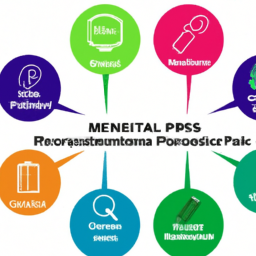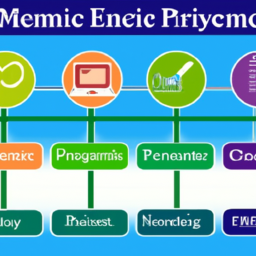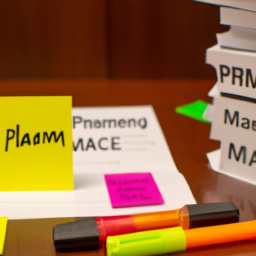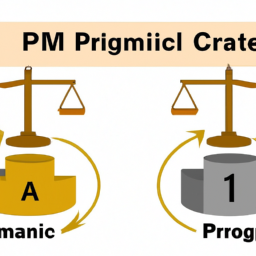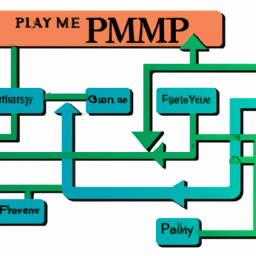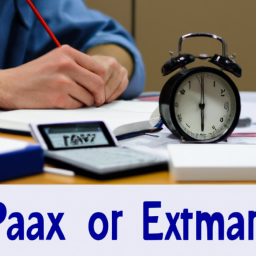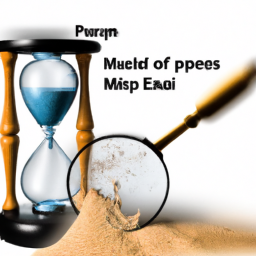So, you think you’ve got what it takes to be a project management expert? Well, get ready to put your skills to the ultimate test with the PMP Exam.
This comprehensive assessment is designed to challenge even the most experienced professionals in the field. But fear not, because in this article, we’ll break down what you can expect from this rigorous examination, provide tips and strategies for success, and help you prepare to conquer the PMP Exam with confidence.
Get ready to prove your project management prowess!
Key Takeaways
- The PMP Exam is globally recognized and offers various benefits such as increased job opportunities and higher salaries.
- The exam covers initiation, planning, execution, monitoring, and closing of projects, and consists of 200 multiple-choice questions with a four-hour time limit.
- Key areas covered in the exam include project integration management, project scope management, and project time management.
- To succeed in the PMP Exam, effective time management, a realistic study plan, and reliable study materials are crucial. Regular practice with sample questions and mock exams is also recommended.
The Importance of the PMP Exam
You might be wondering why the PMP exam is so important for your project management career. Well, let me tell you about its significance and the benefits it brings.
Firstly, passing the PMP exam gives you a globally recognized certification that demonstrates your expertise in project management. This certification opens up a world of opportunities, increasing your chances of landing better job positions and higher salaries.
Secondly, the PMP exam helps you develop and enhance your project management skills. The knowledge and techniques you gain from studying for the exam can be immediately applied to your projects, making you a more effective and efficient project manager.
Additionally, the PMP certification sets you apart from your peers, giving you a competitive edge in the job market.
Overall, the PMP exam is a crucial step towards advancing your project management career and reaping its numerous benefits.
What to Expect on the PMP Exam
When preparing for the PMP exam, it’s important to understand what to expect. The PMP exam consists of 200 multiple-choice questions that you will need to answer within four hours. It covers a wide range of project management topics such as initiation, planning, execution, monitoring, and closing.
To pass the exam, you need to achieve a minimum score of 61%. Many candidates make common mistakes during the exam, such as not managing their time effectively or not thoroughly understanding the question before answering. It is crucial to read each question carefully and eliminate any obviously incorrect answers.
Additionally, practicing with sample questions and taking mock exams can help you familiarize yourself with the exam format and improve your chances of success.
Key Areas Covered in the PMP Exam
The PMP exam covers a wide range of project management topics such as initiation, planning, execution, monitoring, and closing. To help you prepare for this challenging exam, it is important to have a clear understanding of the key areas covered.
Here are some of the main topics you can expect to find on the PMP exam:
-
Project Integration Management: This includes developing the project charter, creating the project management plan, and directing and managing project work.
-
Project Scope Management: This involves defining and managing the project scope, as well as controlling any changes to the scope.
-
Project Time Management: This focuses on developing and controlling the project schedule, ensuring that all tasks are completed on time.
To effectively study for the PMP exam, it is crucial to have access to comprehensive and up-to-date study materials. These can include textbooks, online courses, practice exams, and study guides. By utilizing these resources, you can gain a solid understanding of the PMP exam content and increase your chances of success.
Now that you know the key areas covered in the PMP exam and the importance of using proper study materials, let’s explore some tips and strategies for PMP exam success.
Tips and Strategies for PMP Exam Success
To maximize your chances of success on the PMP exam, it’s essential to implement effective study strategies and utilize reliable study materials.
One important aspect to consider is time management. The PMP exam is time-bound, so it’s crucial to allocate your time wisely. Create a study schedule and stick to it, ensuring you allocate enough time to each topic.
Additionally, make use of practice exams to simulate the real exam conditions and improve your time management skills.
Another key factor is selecting the right study materials. Choose materials that are aligned with the latest version of the PMP exam and are from reputable sources. Look for study guides, online courses, and practice questions that cover all the knowledge areas and provide comprehensive explanations.
How to Prepare for the PMP Exam
Preparing for the PMP exam requires implementing effective study strategies and utilizing reliable study materials. To ensure success, here are some key steps to follow:
-
Create a study schedule: Develop a realistic and structured study plan that allows you to cover all the necessary topics and allocate sufficient time for each.
-
Gather reliable study materials: Invest in reputable PMP exam prep books, online courses, or practice exams to ensure you have access to comprehensive and up-to-date information.
-
Practice, practice, practice: Regularly attempt sample questions and mock exams to familiarize yourself with the exam format and assess your knowledge gaps.
By following these steps and sticking to your study schedule, you will be well-prepared for the PMP exam.
Remember to also consider your exam schedule and plan your preparation accordingly to avoid last-minute cramming and unnecessary stress.
Frequently Asked Questions
How Long Is the PMP Exam Valid for Once You Pass It?
Once you pass the PMP Exam, the validity of your certification lasts for three years. To maintain your PMP credential, you must earn 60 professional development units (PDUs) within this timeframe. This ensures that you stay up-to-date with the evolving practices in project management.
To prepare for the PMP Exam, it is crucial to dedicate sufficient time for studying, create a study plan, practice with sample questions, and seek additional resources such as study guides and online courses.
Can You Retake the PMP Exam if You Fail It the First Time?
If at first you don’t succeed, don’t fret! You have the opportunity to retake the PMP exam if you fail the first time.
The passing score for the PMP exam is determined by the Project Management Institute (PMI) and can vary. So, don’t let one setback discourage you.
Learn from your mistakes, study harder, and go for it again. Success is within your reach!
What Is the Passing Score for the PMP Exam?
The passing score for the PMP exam is determined by the Project Management Institute (PMI).
To prepare for the PMP exam, you should focus on studying relevant materials and resources. Effective PMP exam preparation requires a thorough understanding of project management concepts and techniques.
Utilize various study materials, such as practice exams, study guides, and online courses, to enhance your knowledge and increase your chances of success on the exam.
Stay organized and focused during your study sessions to maximize your learning potential.
Are There Any Prerequisites or Eligibility Criteria to Take the PMP Exam?
To take the PMP Exam, you must meet certain prerequisites. Before registering, make sure you have a minimum of a high school diploma or an equivalent qualification. Additionally, you need to have completed 35 hours of project management education.
Once you meet these requirements, you can start the registration process. There are various PMP Exam study resources available that can help you prepare for the exam and increase your chances of success.
Is the PMP Exam Available in Languages Other Than English?
The PMP exam, available in various languages, tests your project management skills like a marathon tests a runner’s endurance.
To prepare for the exam, focus on understanding the language options available and choose one that suits you best. Additionally, develop effective preparation strategies such as studying the exam content outline, taking practice tests, and participating in study groups or training courses.
These strategies will help you ace the PMP exam in your preferred language.
Conclusion
So, are you ready to put your project management skills to the ultimate test?
The PMP exam is not only important for your professional growth, but it also validates your expertise in the field.
With a clear understanding of what to expect and key areas covered in the exam, you can now start preparing with confidence.
Remember, success on the PMP exam requires proper planning and strategic studying.
So, why wait? Take the leap and prove your project management prowess!


